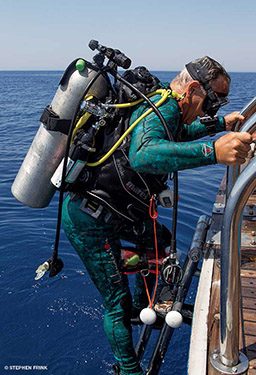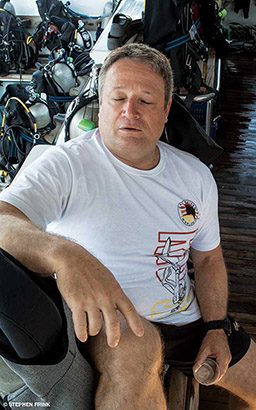
A 53-year-old man was diving at a resort in the South Pacific. He was doing approximately four dives per day; all his dives were on air, and all were within his computer’s no-decompression limits. In the evening on the third day, approximately three hours after his last dive and a half hour after dinner, he began to experience severe abdominal pain. The pain radiated to his back, just below his right shoulder blade. He vomited several times, felt weak and needed help walking. Concerned about the possibility of severe decompression sickness (DCS), his friends called a taxi and rode with him to the local hospital.
Some things about this diver’s symptoms and recent history suggest DCS, and most doctors would include it on their list of differential diagnoses. The evaluating physician in this case considered it, but he knew that other potential causes had to be eliminated first. After a cardiovascular emergency was ruled out, blood tests and ultrasound imaging of the diver’s abdomen revealed stones in the gallbladder that were causing acute inflammation. The diver underwent laparoscopic surgery and made a successful recovery.
Symptoms of DCS
Books and articles about DCS usually include an extensive list of signs and symptoms. It is important to remember that none of the signs and symptoms in any such list is exclusive to DCS. Here are examples of some of the most common symptoms of DCS:
- Headache
- Lightheadedness and/or dizziness
- Nausea
- Joint and/or muscle aches
- Fatigue, lethargy and/or generalized weakness
As you can see, these symptoms can apply to a wide range of medical conditions, not just DCS. This can make diagnosing DCS a challenge.
Medications

A 48-year-old woman completed a dive to 95 feet for 25 minutes on 32 percent nitrox. Approximately 10 hours after surfacing she began to experience widespread but intense muscle pain. She could not find a comfortable position, and nothing seemed to offer relief. She called emergency medical services (EMS), which transported her to the local hospital. When discussing her medical history, the doctor found out that the woman had begun taking a statin medication to lower her cholesterol three weeks earlier. Muscle pain is a rare side effect of statins, and blood test results suggested that her pain was most likely due to the medication. However, the hyperbaric physician who was consulted did not want to dismiss the possibility of DCS and treated the diver in the chamber with a U.S. Navy Treatment Table 6 (TT6). The hyperbaric treatment had no effect on her symptoms, which confirmed that the muscle pain was probably due to the medication.
Whenever you begin taking a medication, whether prescription or over-the-counter, make sure you familiarize yourself with the potential side effects. As this case illustrated, the side effects of some medications can mimic DCS. Medications can also affect your ability to function normally, regardless of whether you’re on land or underwater. Common seasickness medications, for example, come with advisories stating that they may cause drowsiness. Physicians trained in dive medicine typically recommend waiting at least 30 days after starting a new prescription medication before diving. Similarly, divers should always try nonprescription medications well in advance of diving so they will know how the drugs affect them. In addition to limiting the risk of disorienting or otherwise hazardous side effects at depth, this recommendation also helps reduce the risk of confusing the medication’s side effects with DCS.
Musculoskeletal Symptoms

Diagnosing DCS can be challenging: It is a relatively rare condition, there are no lab tests to confirm it or rule it out, and it shares signs and symptoms with many other illnesses and injuries. Divers who have pre-existing musculoskeletal issues such as spinal problems, arthritis or residual effects from previous trauma can be particularly susceptible to diagnostic uncertainty. The physical stresses and activities associated with diving and travel (e.g., carrying heavy equipment, enduring uncomfortable sleeping or travel accommodations, swimming against currents or experiencing boat rides in rough seas) can aggravate existing conditions. Strains, sprains and overuse injuries that occur in the absence of diving are relatively easy to diagnose. But when diving is involved, a doctor might reasonably decide to conduct a costly and time-consuming hyperbaric chamber treatment to be on the safe side.
Musculoskeletal problems, whether pre-existing or not, can manifest as pain, numbness, loss of strength and/or reduction of mobility, all of which are also possible symptoms of DCS. The key to learning the true cause of such symptoms is a thorough review of the diver’s medical history and the circumstances surrounding the complaints.
DAN Medical Services often receives calls from divers who have traveled to tropical or subtropical destinations and are experiencing a severe headache, multiple joint or muscle aches, abdominal pain, nausea and general malaise, often after a few days of diving. With no additional information it would be easy to conclude that these symptoms were the result of DCS. However, further inquiry often reveals a fever and diarrhea. This suggests a tropical disease rather than DCS. When such reports include a fever but not vomiting or diarrhea, this suggests dengue or another tropical virus. People with these symptoms may require prompt medical attention but not evacuation to a recompression facility.
Diagnosis by Exclusion
Diagnosing DCS is generally a process of ruling out other causes. It is imperative that we not discount the possibility of nondiving-related injuries or illnesses just because someone was diving. However, this is not to suggest we should discount the risk of DCS: When a person has been diving, DCS absolutely needs to be considered in the physician’s differential diagnosis.
A 46-year-old male diver on a weeklong dive trip on a liveaboard vessel was doing four or five dives per day. All dives were within recommended recreational no-decompression limits. His deepest dive was to 115 feet, which was his first dive on the third day. The next morning he complained of right shoulder discomfort. Five years earlier he had surgery on that shoulder to repair a torn rotator cuff. Since the surgery five years prior he had done more than 80 dives with no problems, but it was not uncommon for him to experience discomfort in that shoulder with exertion or certain activities. Usually he could find a position of comfort, apply ice and take ibuprofen to relieve the discomfort, but this time the symptoms were somewhat different and not as easily relieved.
The diver’s companions believed that his symptoms were due to his previous medical history because they had all dived the same profile without any problems. When the diver finally reported his symptoms to the boat crew, they provided him with high-flow oxygen. Based on the fact that the symptoms were different from those the man typically experienced, the captain diverted the ship toward an island with a dive clinic.
After breathing oxygen for approximately 30 minutes, the diver reported some improvement but not much. The ship arrived at the island 30 minutes later, and the diver was taken to the clinic. The physician on duty evaluated him and discovered that his right arm (his dominant arm) was significantly weaker than his left. He diagnosed DCS and treated the diver with a U.S. Navy TT6, which provided measurable improvement. Because the symptoms did not completely resolve, the doctor treated him again the next day with the shorter U.S. Navy TT5, which brought complete resolution of the symptoms.
There is controversy regarding the potential for increased risk of DCS at the site of a previous injury. Little scientific data addressing that issue is available. But controversy notwithstanding, we know that when people with pre-existing musculoskeletal problems choose to dive, diagnostic confusion can result. If you or your dive buddy has such issues, it is imperative for both of you to know what the other person’s usual state looks like. Before diving, discuss any existing pain, movement restrictions, weakness or other information that establishes a clear baseline. Communicating information about a diver’s normal state can be of great value. Any variation of symptoms from previous experience demands assessment but does not by itself constitute a definitive diagnosis. Divers with these sorts of problems should regularly get a detailed neuromuscular exam by a doctor. After a dive is no time to discover a deficit that may or may not have been there before.
The Morning After
A group of friends in their early 30s was on a dive vacation on a Caribbean island. They did four dives on their first day; their first dive was to 85 feet, and the next three were to 60 feet or shallower. They waited at least an hour between each dive, breathed air and had bottom times that were all within their dive computers’ no-decompression limits. All dives were uneventful.

The group went out for dinner and drinks that evening. The next morning they met for breakfast prior to boarding the dive boat. A 33-year-old male member of the group was absent. His roommate reported that when he left, the friend was in the bathroom and was expected to join the group later. After eating, the roommate and two others went to check on their friend. He was in bed and appeared pale. He complained of a severe headache, nausea, weakness and feeling “totally out of it.” The headache was severe enough that he was sensitive to light. He also reported vomiting “once or twice.” The group decided to take him to be evaluated at the local clinic; because they had been diving they were concerned about DCS. The diver had a slight stagger when walking but required no assistance.
The clinic was a five-minute cab ride away from the resort. The physician on duty and her assistant obtained the diver’s vital signs and conducted a neurological examination. The physician also obtained a history of events. The diver denied any symptoms prior to going out for the evening. He also admitted that the events following dinner were not clear to him because he had consumed “a lot” of alcohol, which his friends confirmed. The physician ordered the administration of IV fluids, acetaminophen and meclizine (antinausea medication). The doctor also instructed the man to avoid diving for the next 24 hours and to return to the clinic if he didn’t feel better that day. The diver rested and was able to eat and drink (nonalcoholic beverages) over the course of the day, and he felt much better by that evening. The next morning he was feeling 100 percent better and resumed diving with no further issues.
Having a good time on vacation is part of the experience, but overindulging in alcohol during a dive vacation is not prudent. There is suspicion that alcohol consumption before or after diving could contribute to DCS, but more importantly, the aftereffects can easily be confused with DCS. Many divers in similar situations have needlessly undergone hyperbaric treatments.
Conclusion
The signs and symptoms of DCS are not exclusive to that condition. However, when a person experiences signs or symptoms after diving, DCS is very often presumed to be the diagnosis. This is not all bad, because it encourages divers and dive staff to administer oxygen and ensure the injured diver gets prompt medical care. But it becomes a problem when divers refuse to accept alternative explanations and become fixated on the need for chamber therapy at the expense of other diagnostics and/or treatments that may be delayed. In addition, the diversion of a nondiving-related emergency from appropriate medical treatment for an unnecessary recompression treatment, especially by air late at night, can introduce additional risks to the patient as well as the aircrew. There are many medical conditions much more serious than DCS for which timely treatment is critical.
In the event of symptoms after diving, provide oxygen and get the injured diver to the closest medical facility. Don’t hesitate to call EMS if the situation is serious, and feel free to call the DAN® Emergency Hotline (+1-919-684-9111) at any time. Tell the doctor that the person was diving, and encourage him or her to contact DAN for consultation. But keep in mind that there are more dangerous ailments than DCS, some of which must be considered first.
© Alert Diver — Q4 Fall 2015